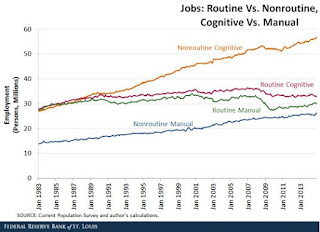Originally published on Dusty World in April, 2016: https://temkblog.blogspot.com/2016/04/deep-learning-ai-future-of-work.html
 |
| Most jobs have tedium as a prerequisite. No one does tedium better than a machine, but we still demand that kind of work for humans… to give them self worth? |
This isn’t the first time our compulsive urge to assign monetary value to survival has struck me as strange. This time it was prompted by an article on deep learning AI and how machines are close to resolving many jobs that are currently reserved for human beings (so that they can feel relevant). We like to think employment is what makes us worthwhile, but it really isn’t, and hasn’t been for a long time.
The graph above is from that article and it highlights how repetitive jobs are in recession as machines more effectively take over those roles. As educators this leaves us in a tricky situation because we oversee an education system modelled on factory routines that is designed to fit students into repetitive labour (cognitive for the ‘smart’ office bound kids, manual for the other ones).
How can an education system modelled on Taylorist principles produce students able to succeed in the Twenty-First Century? It can’t, because it can’t even imagine the world those students are going to live in. There is a lot of push back in educational theory around the systemic nature of school administration, but I see little movement from management other than lip service. Educational stakeholders from unions to ministries and even parents like our conservative education system just the way it is.
| Between neuroscience and freeing ourselves of academic prejudices (ie: creativity happens in art class), we could be amplifying what human beings are best at instead of stifling it. (from Newsweek) |
In the meantime, people who are taught to sit in rows, do what they’re told and hit clearly defined goals are becoming increasingly irrelevant. We have machines that do those very things better than any human can, and they’ll only be doing more of it in the future.
Ironically, just at the time where human beings might have technically developed a way out of having to justify their survival all the time they are also crippling their ability to do what humans do best. In recent years creativity,as critically assessed in children, is diminishing. The one thing we are able to do better than machines is being systemically beaten out of us by outmoded education systems and machines that cognitively infect us with their own shortcomings!
Machines offer us powerful tools for a wide variety of tasks. I use digital technology to express my interest in the natural world, publish, and learn, but for the vast majority of people digital technology is an amplifier of bad habits and ignorance. Many people use the personalization possible in digital technology to amplify their own prejudices, juice their brains like Pavlovian dogs in empty games, and all while living in a cocoon of smug self justification.
Just when we’re able to leverage machines to free human beings from the tedium of working for a living, those same machines are shaping people to be as lazy, directionless and self assured as they wish.
In the meantime the education system keeps churning out widget people designed for a century ago and the digital attention economy turns their mental acuity into a commodity.
Rise of the machines indeed.


